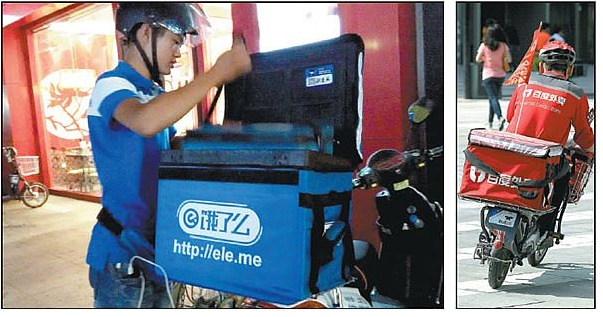Mealtime goes mobile for foodies

Food delivery motorcyclists from ele.me and Baidu Waimai on the streets in Beijing. (Photo by Da Wei for China Daily)
Sheng Kun rarely used to have breakfast. But since March, he has been ordering it online at ele.me every day, thanks to the food delivery boom in China.
“Placing orders online is so convenient and cheap. I can order breakfast on my phone the day before and pick it up at a spot near my office the next day,” said Sheng, 26, a game designer in Beijing.
Last Monday, for instance, Sheng ordered via his phone a bowl of mung bean porridge and two steamed buns for 3 yuan (US$0.47), at 30 per cent of the price if he had bought them at a restaurant.
“Why bother to line up at the restaurant for a meal ever again?” Sheng added. “These online food ordering sites offer such cheap meals and good food delivery services.”
Sheng is not alone. In the second quarter, online-to-offline, or O2O, catering industry transactions hit 8.2 billion yuan ($1.29 billion), up by 89 per cent from last quarter, according to Beijing-based Internet Consultancy Analysys International.
Although online food ordering only accounts for a small proportion of the catering industry, as more people turn to mobile apps and websites for food delivery services, its market volume is expected to hit 40 billion yuan in 2017, research company iResearch Consulting Group forecasts in a report.
One of the main reasons for the rapid surge in China’s online food ordering sector is a price war led by Internet companies.
Heavyweights Baidu Inc. and Alibaba Group Holding Ltd both launched their own O2O platforms to promote food delivery services. Startups, such as ele.me, which is backed by Tencent Holdings Ltd and JD.com Inc., and Groupon-like meituan.com, are also eyeing the sector.
“Currently, these online platforms are offering similar services in terms of partnered restaurants and delivery qualities,” said a venture capitalist who declined to be identified.
“Their differences are not big enough to lure customers away from competitors, so a powerful weapon is to launch a price war to vie for price-sensitive users.”
So far, the strategy has worked.
Due to heavy subsidies, meituan.com has seen its market share rise by more than 7 per cent to 34.5 per cent in the first six months of this year in terms of transaction values, taking the crown from ele.me, which now has a market share of more than 33.5 per cent, according to Analysys International. While the food delivery services launched by Baidu and Alibaba hold 12.7 per cent and 4 per cent respectively, they trail market leaders because of their late entry to the market.
However, winning an increased market share purely through burning cash is not a sustainable strategy. “Customers have no loyalty. They just choose platforms that offer the biggest discounts. When subsides disappear, consumers are also likely to return to the traditional way of eating at brick-and-mortar restaurants,” Liu Xuwei, an analyst at Analysys International, said.
Also, the online battle leaves fledgling companies financially overstretched. Earlier this month, ele.me reported that it had raised $630 million from investors, a deal that values the company at $3 billion. But the announcement has triggered doubts from industry analysts who believe the company is overvalued.
Meituan.com, which received $700 million in funding at the start of the year, is also reportedly searching for a new round of funding, while Baidu’s food ordering platform Baidu Waimai also managed to attract $250 million from deep-pocketed investors in July.
“After months of head-on competitions in handing out subsidies, the industry is now looking for money,” said Tao Jingqi, senior analyst at big data firm TalkingData.
What complicates the issue is that except for ele.me, most Internet players that branch out into the sector do not have licenses for delivering food. These businesses are now facing regulatory barriers.
Despite these difficulties, market players are beefing up efforts to improve and diversify their services. Kang Jia, co-founder and chief cooperating officer of ele.me, said that the platform is expanding its food delivery services to five peak-time phases in one day.
“Unlike our peers which only focus on the regular three meals, we are adding desserts and snacks in the afternoon since most white-collar workers tend to have a tea break,” Kang said. “Now around 19 per cent of orders are for afternoon services.”
The company is also rolling out special snacks to meet people’s growing appetite late at night.
“Offering snacks at night is the most promising niche because it covers a long time range which starts from 8pm to maybe 2am the next day,” Kang added.
While meituan.com is channeling more resources to build up the inventory on its platform, Wang Huiwen, who is in charge of food delivery services at the company, said, “We are now taking steps to add more items such as fruit, flowers and other products sold at supermarkets.”
RELATED STORIES
Healthy food delivered right to your doorstep